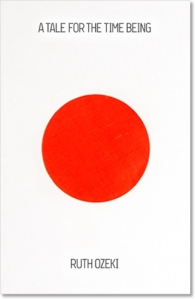I am so excited for the 23rd of next month, when all the excitement of the venerated Man Booker will get under way once more and stir up all that delicious controversy it manages to elicit each year. And slowly, I am limping to the finish with these reviews of the 2013/2014 shortlist, soon to be completed with a Franny vs. Perks post on The Lowland.
A Tale for Time Being was no exception to the excellence I have been greeted with so far in this shortlist. It was also an incredibly emotional book to end my reading on. Obviously I don’t want to give an ending to a story away but suffice to say it was pretty emotionally devastating while being on the enjoyable side of genius. There is so much to say about Ruth Ozeki’s masterpiece that I hardly know there to start and I am aware I won’t be able to mention half the things I want to. Early on I should emphasise, you should read this book. Not everyone will love it but if it is your type of literary fiction, it’ll stay with you for a long time past the wonderful ending.
One of the most important elements to mention is the novel’s meta-narrative. One side of the split story comes from a half Japanese author called Ruth, living on a tiny island off British Columbia with a severe case of writer’s block. Who could it be?! Ruth Ozeki even kept her husband’s name the same, though I have no confirmation as yet that they own a cat called Pesto. Ruth comes across a package on a local beach swept across the Pacific Ocean, a seeming time capsule from Japan – a Hello Kitty lunchbox containing a diary, some letters written in French and a watch from World War II. As she begins to read the diary of the young Nao from across the ocean, she is inspired and sucked in by her adolescent fears and troubles.
‘Adolescent troubles’ in fact trivialises what Nao presents us with in her humorous and heartbreaking narrative. Firstly, there is that ever recurring theme from this Booker shortlist, that of never quite belonging once you have been wrenched from your home country. However in this instance, Nao has been torn from American rather than replanted there, as in We Need New Names or The Lowland. She yearns for the acceptance of the country she grew up in, rather than the cruelty she suffers at the hands of her Japanese school mates. Nao is such a likeable character that her bravery and humour in the face of cruelty and indifference can make the book a hard read at times. But it means that we stick with her – Ruth (the reader) never wants to abandon her and neither do we.
The subject of time alluded to in the title is not misleading and in fact an overriding theme in the novel. It explores one of the long questioned facets of man’s existence in a quiet and beautiful manner. Ruth is losing her memory – time is slipping away from her. Moments of her life become confused because of this – she is unable to rationalise the time period difference that exists between her and the writer of the diary. To her, Nao will always be 15. It means that Nao is loose in time, a Hello Kitty lunchbox adrift on the eons of the Universe. It suggests that her dream from the beginning of her diary to ‘drop out’ of time has finally come true – she has put a piece of herself in a box and sent it across the ocean, leaving her true self untraceable to the reader – both Ruth and us. The presence of the omniscient old Jiko, Nao’s 104 year old great aunt also serves to remind us how perspective on time comes with age. A year after 15 looks a lot different to one after 104. We learn that the over lapping of time – all the time beings existing as one – mean we ourselves can influence that which is across oceans and even that which in chronological terms may already have happened.
I may have mentioned this in passing before, but the endings of many of these books I believe are what have set them apart as novels. Many great writers lose their way in the last third of a book, meaning their masterpieces never quite achieve that final resounding note of success they deserve. There are so many examples in this shortlist of books that subvert this trope. Ozeki did not let me down in this instance, bringing this tumultuous novel to a close as only a Zen master could. Utilising the much referenced but little understood principle of Schrödinger’s cat, she leaves us how so many novels do, using the famous experiment to explain her reasoning. The final few pages left me in limbo between bereft and satisfied, sad but content – and as anyone who has read this novel will understand, that was exactly the point.
– Perks

Haven’t read this book yet, but loved her other novel titled “A Year of Meats”.
Really recommend! I haven’t read her other novels but now I’ve experienced this I definitely want to read the others! – Franny x
This was my favourite book on last year’s Man Booker Prize shortlist – looking forward to reading her other two novels 🙂
I’m currently listening to it (Ruth Ozeki reads it) and am completely enchanted by the worlds to which she transports me. I cannot wait to read her other work either! – Franny x
It was a very close second on mine…! So happy she has a backlist to start on.